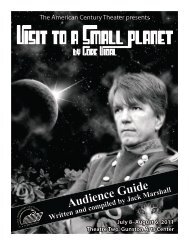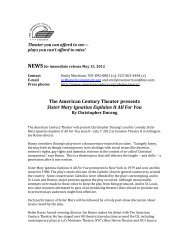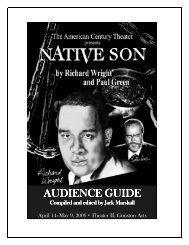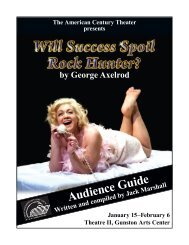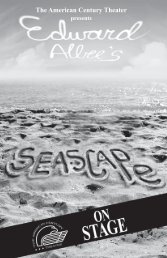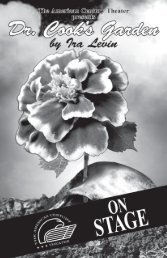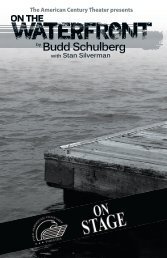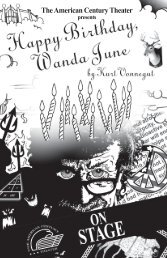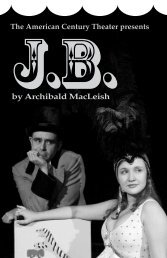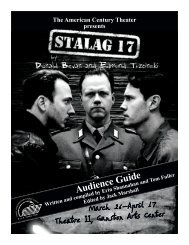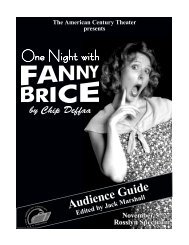Stage Door - The American Century Theater
Stage Door - The American Century Theater
Stage Door - The American Century Theater
Create successful ePaper yourself
Turn your PDF publications into a flip-book with our unique Google optimized e-Paper software.
following the adventures of a traveling underskirt saleswoman. Her play<br />
based on the stories, Our Mrs. McChesney, was produced in 1915, starring<br />
Ethel Barrymore.<br />
Ferber was a prolific and popular novelist. She won the Pulitzer Prize in<br />
1924 for So Big, the story of a woman raising a child on a truck farm outside<br />
of Chicago. Her best known books were Show Boat (1926), Cimarron<br />
(1929), Giant (1952), and Ice Palace (1958). Show Boat, of course, became<br />
a classic Broadway musical that spawned three movie versions and many<br />
popular songs, notably “Old Man River.” Ferber’s books were frequently<br />
adapted to film, notably Cimarron, which won the Academy Award as Best<br />
Picture in 1931, and Giant, which was James Dean’s last film.<br />
Except for the comedy based on her Mrs. McChesney stories, all of Ferber’s<br />
playwriting was confined to collaborations with Kaufman, of which Dinner<br />
at Eight, <strong>Stage</strong> <strong>Door</strong>, and <strong>The</strong> Royal Family are genuine gems, among the<br />
best of <strong>American</strong> stage comedies. <strong>The</strong> other, less successful and seldom seen<br />
fruits of their partnership were Minick (1924), <strong>The</strong> Land Is Bright (1941),<br />
and Bravo! (1948). Why only with Kaufman? <strong>The</strong> two were friends; they<br />
both were members in good standing of the literary luncheon club known as<br />
the Algonquin Round Table, and it seems clear that they liked and trusted<br />
each other. Given Kaufman’s well-earned reputation as an irrepressible<br />
ladies’ man, could there have been a romantic attachment as well?<br />
Highly dubious. <strong>The</strong>re is no evidence that Ferber engaged in a romance or<br />
sexual relationship with anyone of either gender at any time in her life. In<br />
her early novel Dawn O’Hara, the title character’s aunt remarks, “Being an<br />
old maid was a great deal like death by drowning—a really delightful<br />
sensation when you ceased struggling.” It seems that Ferber ceased<br />
struggling. She wrote two autobiographies, A Peculiar Treasure, published<br />
in 1939, and A Kind of Magi, in 1963. Neither suggests that she had affairs<br />
with Kaufman or anyone else.<br />
Edna Ferber died of cancer at age 82 on April 16, 1968, at her Park Avenue,<br />
New York, home. In a lengthy obituary, <strong>The</strong> New York Times said, “Her<br />
books were not profound, but they were vivid and had a sound sociological<br />
basis. She was among the best-read novelists in the nation, and critics of the<br />
1920s and ’30s did not hesitate to call her the greatest <strong>American</strong> woman<br />
novelist of her day.”<br />
11



